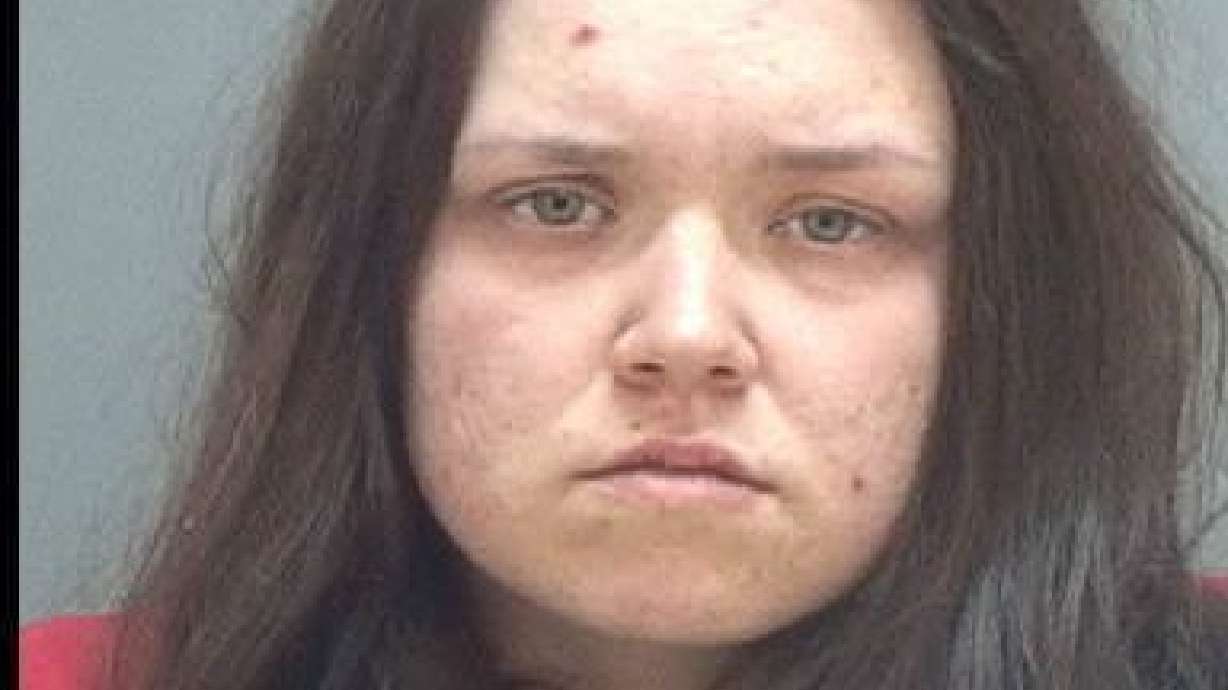Estimated read time: 4-5 minutes
This archived news story is available only for your personal, non-commercial use. Information in the story may be outdated or superseded by additional information. Reading or replaying the story in its archived form does not constitute a republication of the story.
SALT LAKE CITY — For much of the court proceedings Friday, Cassandra Marie Shepard sat quietly, sometimes rocking back and forth ever so slightly.
But when graphic photographs were posted depicting Christina Harms' discolored, blistered hands, stuck in a fist shape, she let out an audible whimper.
"I didn't do this," she said desperately, crying to an attorney behind her.
Later, while watching a taped interview with her 5- year-old daughter, she interjected, visibly emotional: "I can't do it ... I can't do this." She was taken back to a holding cell where her cries could be heard through the courtroom walls. Though she returned a short time later, she remained emotional throughout the remainder of the day-long hearing.
Third District Judge Randall Skanchy did not determine Friday whether there was enough evidence to bind Shepard over on charges of murder and intentional aggravated abuse of a disabled adult, both first-degree felonies, and obstruction of justice, a second-degree felony, in connection with Harms' death, after defense attorneys requested time to file a memorandum on the murder charge.
Harms, 22, was found on March 25, sprawled out on the living room of the Kearns home she shared with Shepard, Shepard's mother Sherrie Beckering, and stepfather Dale Beckering. Police officers had responded on a possible overdose call, and Unified police officer Warren Dallof said Shepard was doing chest compressions on Harms when he entered the home.
"(Shepard) was very erratic, just jumping back and forth, screaming, making random statements," Dallof said of Shepard. "I had to sit her down on a chair and look directly at her to get a few, simple answers."
She has to stay in the closet forever.
–- Five-year-old
Dallof was still talking to Shepard when paramedics indicated Harms was dead.
Shepard told Dallof that she was Harms' caretaker and legal guardian and that Harms suffered from fetal alcohol syndrome. She said Harms had been acting up and throwing tantrums. When Sherrie Beckering arrived at the home, she told the officer that "Christina has been such a difficult little (expletive deleted) lately."
Harms' hands were wrapped in bandages so tight that deputy chief medical examiner Edward Leis said he had to cut them off. Shepard told Dallof that Harms had started taping up her arms, causing blisters, leading to the bandaging.
A pepper flake was found in Harm's eye, but Leis said it caused minimal harm. He determined it was dehydration, positional asphyxia, high levels of sedatives, improper care and confinement that led to Harms' death.
The woman had been bound, crucifix-style in a small closet, and Leis said the position would make it difficult to breathe.
In a taped interview, Shepard's 5-year-old daughter told police that Harms — who the girl calls "Nina" — was often grounded by her mother. She reached her thin arms above her head to demonstrate how Harms was tied to a bar in the closet.
The girl also held her hands just inches apart to show the closet's size and said Harms slept there and ate there.
(Shepard) was very erratic, just jumping back and forth, screaming, making random statements. I had to sit her down on a chair and look directly at her to get a few, simple answers.
–- Warren Dallof
"What are Nina's jobs?" Unified police detective Peggy Faulkner asked the girl.
"Staying in the closet," the girl replied, adding a short time later: "She has to stay in the closet forever."
She said her mother wedged a knife in the door to keep "Nina" in the closet. It was when the girl said Shepard also taped Harms' mouth, on occasion, that Shepard said she "couldn't take it." She soon returned to the courtroom and watched the remainder of the interview.
A second taped interview was played, this one with Shepard's 9-year-old daughter who said much less, answering: "I don't know" to most questions. Whenever Faulkner left the room, the girl could be seen crying, which in turn, made Shepard cry.
The 9-year-old eventually told the detective that Shepard told her not to "talk too much." When Faulkner left again and the 5-year-old entered the interview room, the 9-year-old scolded her sister for telling Faulkner about a bottle of "chemicals" that was used on Harms.
"I'm going to have to cover up ...," the girl said.
Shepard was arrested March 26 after undergoing a psychological exam at University Hospital, Unified police detective Ben Pender testified. The woman had apparently threatened to kill herself. In the early hours of that day, Shepard had taken Harms' 2-year-old daughter to Primary Children's Medical Center and asked a nurse there: "how many years you get for murder in the state of Utah," Chris Cook recalled.
"I didn't really know how to respond," he said. "I said, 'What do you mean? Like accidentally hitting someone with your car or something?' And she said: 'No.'"
Sherrie and Dale Beckering have also been charged in Harms' death. Both have been ordered to stand trial on charges of aggravated abuse of a disabled adult, a first- degree felony.
Shepard's defense attorneys were told to file their memorandum by Oct. 14, with the state's reply due Oct. 21. Until then, Skanchy said he would take the case under advisement.
Email:emorgan@ksl.com








